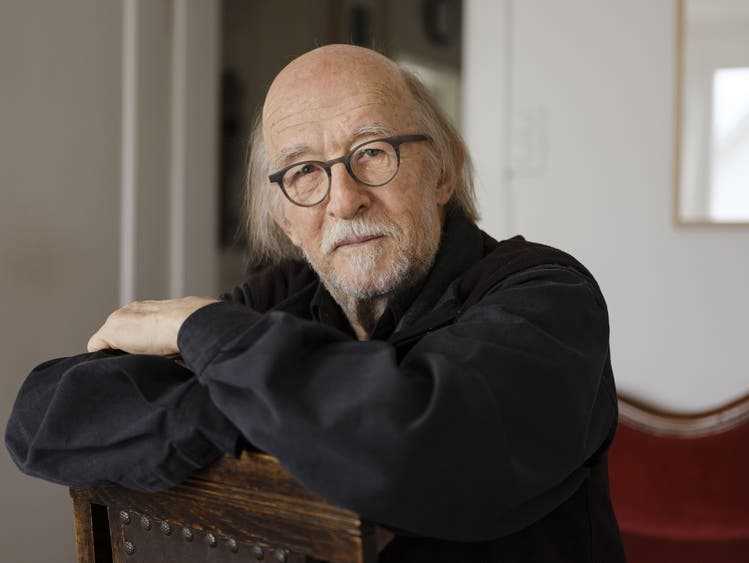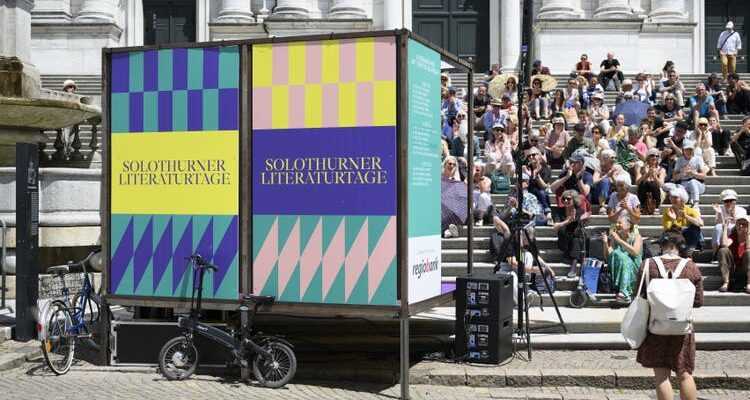After a two-year break due to the pandemic, the Literature Days took place in front of an audience again: It was a déjà vu with many new voices and faces.
Open-air reading on the St. Ursen stairs in front of Solothurn Cathedral.
Was that a little, nasty revenge? Because the Solothurn Literature Days have been mocked too often in the past? About Peter Bichsel, for example, who shuffles through the streets in the same leather vest and tells the same jokes. Or about the authors and their half-baked texts. Or about the moderators, who always find everything “wonderful” and “incredibly good”: the authors and their texts (and maybe themselves too, but at least Solothurn).
After the pandemic break, the Solothurn Reading Festival took place live and with an audience for the first time last weekend. Finally one should see the familiar and also the unfamiliar faces, finally the countless readings would inspire, excite or bore one again. And then this: even before the suitcase was packed, the virus struck. And so you sat at home, stared at a computer screen, listened to the few readings that were broadcast live – and found out: the moderators still find everything “wonderful”, “incredibly good” and “sooo exciting”.
A very ordinary person
Only in between, when it was very quiet in the live stream and the moderator was speechless with amazement, did you think you could hear the clinking of glasses from the Kreuz restaurant. At that point at the latest, one suspected that one was doing penance for a misdeed that one was already about to commit again. Because, alas, the poets. You are a strange bunch. For example, Erwin Messmer from St. Gallen said: “I’m only very sporadically a poet, and otherwise I’m a very ordinary person.” What a pity! For what should “an ordinary person” say to that? That he is only very sporadically, but otherwise completely unusual?
Or the Valaisan Pierre-André Milhit, who likes to flirt with failure and practice the high-wire act when writing. In his reading, he talks about the book “1440 minutes” that was published in 2015. For a day he had written every minute, from midnight to midnight. That was at least 500 pages. Rebecca Gisler from Zurich, who grew up bilingually German and French, is also looking for challenges. But at least a little more German than French. In any case, the first literary texts were written in German, but her debut novel, «D’0ncle», was published in French last year. It was a language experiment, she says, the experiment of returning to the language of her childhood. She didn’t translate the book into German, no, she simply rewrote it in her second language. “Vom Unkel” was recently published by Atlantis.
A specialist in rewriting and rewriting is Reto Hänny, who was awarded this year’s Grand Prix Literature on Wednesday evening. At the Literature Days he read from the book «Stumbling», which is now the third version of the book that was published in 1984 under the title «Flug». The fourth version is now in preparation, reports Hänny. Only a malicious layman could now ask: “Why not write the book right the first time?” Because the trick is that you can always say everything in a completely different way.

The day before the opening of the Solothurn Literature Days, the writer Reto Hänny was awarded the Grand Prix Literature of the Swiss Confederation.
And because, as perhaps the magician of words Michael Fehr would throw in, in art it is not important what you say, but how you say it. No, he didn’t put it that way in Solothurn, but he believes it’s up to the artists to “keep opening doors”. It was not possible to see at home whether he actually opened a door in Solothurn on this occasion, and then another and even a third. Nothing was heard of it. But one could imagine it in one’s own imagination. And that’s why there was perhaps something good about not being there and not having to watch how big words weren’t followed by deeds – but an enchanting reading nonetheless.
The horror of war
And where was Ukraine in all this, where was the war? It came up here and there, for example when Sasha Marianna Salzmann read from her novel “Everything must be wonderful in the human being” and reported on her family history research in the Ukraine. There was no direct talk of the war, but of its long Soviet history. How complex any conversation about the war is was shown in the larger group, when two Belarusians, two Ukrainians and one Russian reported on their experiences.
Each individual could have told the whole evening. In the multitude of different voices, however, the disparate, fleeting and fragmentary prevailed in the end. The hour was up before everyone had spoken. What they had in common: the horror of the invasion, the brutality and the declared intention to wipe out the people’s culture as well. And despite everything, this conversation was an equally passionate and unwavering objection to bombs and terror.
Numerous sold-out readings
pd. · With a large audience in full halls, more than 140 events, some of which were sold out, and around 80 authors and translators from all over Switzerland and abroad, the 44th Solothurn Literature Days celebrated a polyphonic and colorful comeback in the streets of the old town after two years. Symbolic of this was the new outdoor stage in front of the St. Ursen Cathedral, whose staircase formed an atmospheric backdrop for the return of literature to the people during the three days of the festival.
Around 18,500 guests took part in the on-site events and in the audio streams. According to the festival management, this is a slight increase compared to the last regular event in 2019.
